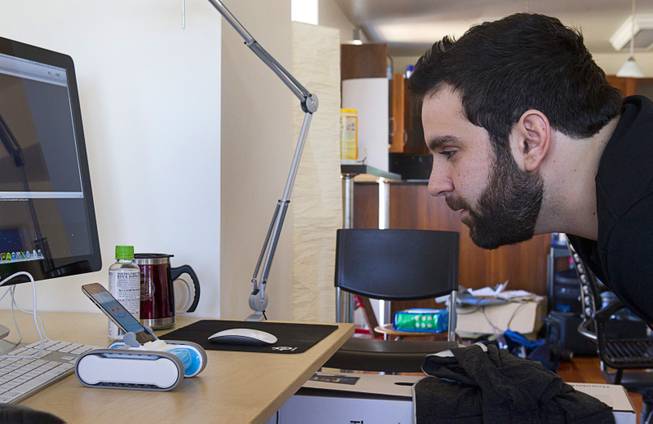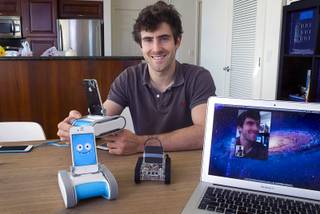
Roboticist Adam Setapen demonstrates a face-following function of the new Romo smartphone robot at the Romotive “Software Cave” in downtown Las Vegas Wednesday, Oct. 24, 2012. The new Romo with enhanced features can be ordered on kickstarter.com and is featured in the Neiman Marcus Holiday catalog.
Tuesday, Oct. 30, 2012 | 2 a.m.
Sun coverage
Call it the little robot that could — with a little help from its friends.
Romo, a plastic robot on rubber treads operated remotely with a smartphone, is leading its young developers into new territory, not only for them but for almost any Las Vegas-based business.
Place your smartphone into a jack on top of Romo, and with another smartphone or computer, you can remotely move the robot — even if it's halfway around the world. So, a grandma in Las Vegas could operate a Romo being played with by her granddaughter in China. The granddaughter, in turn, would see grandma's face and hear her voice; grandma would see whatever Romo sees.
Weeks ago, Romotive, which makes the device, announced it had obtained a $5 million investment from Sequoia Capital and others. Now Romotive is in the process of getting the robots manufactured in China.
From selling a few hundred robots a year ago and employing a handful of people, the company now employs 18 in Las Vegas, and the plant in Shenzhen, China, will crank out 4,000 to 8,000 Romos per week, CEO Keller Rinaudo said.
“We’ve increased by a factor of six from a year ago,” he said.
Rinaudo gives much credit to Vegas Tech Fund, which a year ago invested $500,000, the fund’s maximum, in Romotive. It wasn’t just the money that helped, Rinaudo said; it was partners Tony Hsieh and Fred Mossler taking the time to “help us understand where we want to take it and what we want to do with the company.”
Hsieh also found the early company employees a place to stay in the Ogden. Now the company’s employees occupy 10 apartments in the Ogden, Rinaudo said.
In typical Hsieh fashion, he deflected all credit, even though the fund’s original investment in Romotive is worth many times its original amount on paper.
More than this single investment, though, Vegas Tech Fund is quietly becoming one of the foundations upon which several tech startup companies are building their base of operations and planting roots in Las Vegas.
Hsieh said the fund is just one more way “to accelerate the tech startup ecosystem in downtown.”
Aside from Romotive, he and his partners have invested in:
• Wedgies, a means for informal social polling that describes itself as “a simple survey to share with friends. They work anywhere you can copy and paste text.”
• Rolltech, which “allows bowlers to automatically track scores and statistics in real time, share … with friends and compete globally without leaving their favorite bowling center.”
• The Spirit Project. This is technology that “uses evidence-based methodologies to streamline the delivery and evaluation of prevention and intervention strategies to at-risk youths and families, resulting in significant cost savings to local governments.”
• Ticket Cake, a website that helps event organizers sell tickets.
• Fandeavor describes itself as “offering a wide range of money-can’t-buy” experiences to customers, such as access to a broadcast booth during a professional sports match.
• Digital Royalty, which helps develop strategies to grow its clients' brands.
• LaunchBit. Its website says it is an “ad network for email that helps advertisers reach their target demographic through niche email newsletters.”
• LocalMotion, which builds small electric vehicles that can be shared in a local network. “We deliver employee transportation solutions to corporate campuses,” its website says.
• Not Safe For Work Corporation, a website billing itself as “the future of journalism, with jokes.”
• Ecomom, which researches various products and assesses them based on health and safety and providing that information to consumers.
Ecomom founder Jody Sherman moved his company last year from California to Las Vegas. It grew from about 15 employees back then to 34, with 24 of them in Las Vegas. (Hsieh said companies Vegas Tech Fund has invested in employ up to 150 people.)
In a year’s time, Sherman said, the company has grown about 300 percent and recently raised $5 million from other investors. He and his wife also live downtown.
"It has helped us in so many ways,” Sherman said of the tech fund. “They’ve helped us identify new employees, get smarter about logistics, reducing the costs for shipping and working to get more plugged into the community.”
Vegas Tech Fund defines itself as a “seed stage investment fund.” Companies targeted for investment will be “passionate about building community in downtown Las Vegas.” More specifically, its website says its aim is “to increase the creative class of downtown Las Vegas.”
That’s a familiar mantra to those who have read about Hsieh and the move of his Zappos headquarters from Henderson into the former Las Vegas City Hall in late 2013. Hsieh announced the move in late 2010. Earlier this year, 200 of those company employees moved into temporary offices on Third Street.


Join the Discussion:
Check this out for a full explanation of our conversion to the LiveFyre commenting system and instructions on how to sign up for an account.
Full comments policy